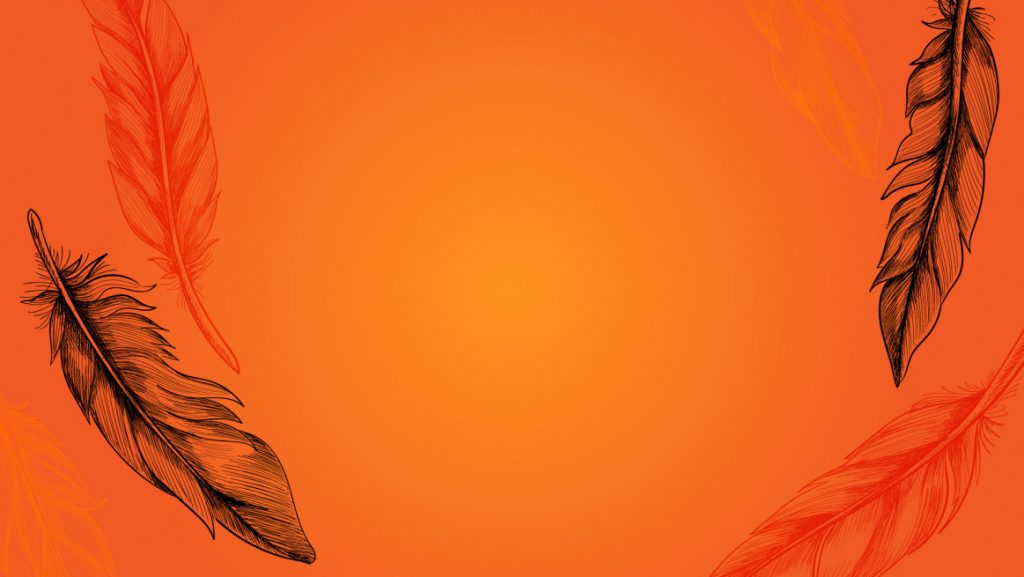Please note that this post speaks about residential schools and the meaning behind Orange Shirt Day and the National Day for Truth and Reconciliation. We acknowledge that the land in which we work from at the The University of Toronto has been, for thousands of years, the traditional land of the Huron-Wendat, the Seneca, and the Mississaugas of the Credit. Today, this meeting place is still the home to many Indigenous people from across Turtle Island and we are grateful to have the opportunity to work on this land. Learn more about which lands you may reside on, and the treaties and histories connected with it, at: https://native-land.ca/ or https://www.whose.land/en/
On September 30th we commemorate Orange Shirt Day, a day intended to raise awareness on the centuries long impact Canada’s Residential School System has had on Indigenous communities, knowledge, traditions, and beyond. Orange Shirt day comes from the experience of Phyllis Webstad (Stswecem’c Xgat’tem First Nation), who was six-years-old when she first arrived to a residential school. On her first day of arriving at the school she was stripped of her new orange shirt. This is what she has shared on what it felt like – and you can learn more about Phyllis’s story in the link provided:
“When I got to the Mission, they stripped me, and took away my clothes, including the orange shirt! I never wore it again. I didn’t understand why they wouldn’t give it back to me, it was mine! The color orange has always reminded me of that and how my feelings didn’t matter, how no one cared and how I felt like I was worth nothing. All of us little children were crying and no one cared.” – Phyllis Webstad
https://www.orangeshirtday.org/phyllis-story.html

Phyllis’s story represents the legacy of colonial violence in Canada, the thousands of children forcibly removed from their lands, home, families, ties to culture and support – both survivors and those who never came home. It’s also important to acknowledge the impact residential schools and colonial violence has on generations that followed, and are still very much present in our world today. Orange Shirt Day honors these lives, while also centering the importance of honoring indigenous history, culture, resilience, futures, and the importance of reconciliation. This is especially significant as the sites of former residential schools continue to be searched, the thousands of children’s bodies that have been found to-date, and the justice that must follow.
The Government of Canada has marked September 30th as the National Day for Truth & Reconciliation. Although it is recognized as a federal holiday, this is also an important opportunity to reflect on how we continually work in allyship with Indigenous communities. We recognize that to truly honour the lives of lost children and survivors of the residential school system and Indigenous communities of Canada, the journey of reconciliation extends beyond this day. It takes engaging with indigenous knowledge, stories, resources, and reflecting on our own positionality in the worlds we are in. A few members of our team took a moment to share their thoughts on how they plan to commemorate this day by reflecting on the question below, and we encourage our community to answer this as well.
What does reconciliation mean to you based on your own positionality?

“I’m very aware of my positionality as a settler on the land both where I live and where I work. My children and I will be wearing our orange shirts on this day as a symbolic act of remembrance. I’m planning to spend some time alone in nature reflecting on what it means to be a settler on this land, and grieve injustices not just of residential schools, but of colonization in general and its impact on Indigenous people. For my family and I, reconciliation is an ongoing topic of conversation and Thursday we will intentionally dedicate time to reflecting together.”
– Julia Allworth, Manager of Innovation Projects

“Throughout my undergraduate and post-undergrad education, I hadn’t had the opportunity to truly learn the history of Indigenous people in Canada, until now. I decided to take an elective course on Indigenous Issues in Health & Healing as an aspiring pharmacist to ensure I am delivering care equitability to all patients. This has opened my eyes to the very fact that it was no one’s responsibility but my own to self-educate and carefully listen to the experiences of Indigenous individuals. I’ve learned that colonialism is not just of the past, but is present today and plan to reflect on how I can commit to decolonization through my work and day-to-day life, and understand there is still lots to learn.”
– Betelehem Gulilat, Content Writer

“I’ve been reflecting a lot on if I really have made steps in my life as a settler on these lands towards allyship and reconciliation. I’m honouring time today to reflect on how many more children have been found in mass graves across “Canada” since May – to truly feel the gravity of what that means. I’m going to continue to speak about this part of our history in my circle of influence – encouraging people to use language and think about things in a different perspective, buying from Indigenous-owned businesses or supporting Indigenous creators. One thing I can say is I’m so grateful that I’ve had moments in my education to learn about indigenous knowledge and worldviews, and I’m committed to continuing to unlearn, disrupt, and challenge aspects of our worlds that actively harm indigenous communities.”
– Kaitlyn Corlett, Senior Project Assistant
The Journey of Allyship and Reconciliation:
We understand that everyone is at different stages of their journey towards allyship and reconciliation, and where you are at is not what’s important, but the journey itself. Here are 5 ways that can support folx on this journey, along with some additional ways to support Indigenous communities moving forward:
- Read books by Indigenous authors & engage in educational opportunities
- Review the 94 Truth and Reconciliation calls to action and commit to at least one (you can also take a look at the 34 calls to action UofT has committed to in response to this report)
- Watch online events hosted by local indigenous organizations, or the National Centre for Truth and Reconciliation
- Connect with local indigenous organizations (cultural centers, land & water protectors, youth groups, services, etc.) – and support them however you can
- Read Phyllis Webstad’s book “The Orange Shirt Story”, and begin to engage in the history of residential schools
Even if it’s just one thing on this list, it makes an impact. Provided are some additional resources and materials that might support you in making one of these points possible. This is by no means exhaustive, and we encourage you to provide any resources in the comments below!
In the U of T Community:
- On September 30 at 2 pm, please join the Office of Indigenous Initiatives for a virtual, tri-campus Orange Shirt Day event featuring Lee Maracle
- Show support and solidarity by wearing orange and using an Orange Shirt Day virtual background and/or profile icon
- Engage in the many books, podcasts, and activities provided by the UTM Indigenous Centre: https://www.utm.utoronto.ca/indigenous-centre/orange-shirt-day-resources
- Take part in the Indigenous Cultural Competency Training series for all Students, Staff, Faculty, and Librarians:
- This series includes the following sessions: Speaking Our Truths: The Journey Towards Reconciliation (Part 1 and Part 2); Reconciliation: Walking the Path of Indigenous Allyship; and Reflecting on Land Acknowledgements. Employees can register for this training through the Centre for Learning, Leadership, and Culture (LLC). Students can register for training through the Career Learning Network (CLNX).
- Additional services available to all UofT community members:
- National Indian Residential School Crisis Line 1-866-925-4419
- Employee and Family Assistance Program (EFAP) 1-800-663-1142
- Explore many more resources in provided by the Equity, Diversity & Inclusion Office & the UTM Indigenous Centre in the PDF provided below: [ insert PDF]
- Learn about additional community opportunities and resources at:
- The Centre for Indigenous Studies: https://indigenousstudies.utoronto.ca/news-events/
- First Nations House: https://studentlife.utoronto.ca/department/first-nations-house/
- UTM Indigenous centre: https://www.utm.utoronto.ca/indigenous-centre/
- Events and resources hosted by UofT Scarborough: https://utsc.utoronto.ca/news-events/our-community/u-t-scarborough-honours-national-day-truth-and-reconciliation-and-orange-shirt-day
- Additional resources, organizations, events, news and more: https://indigenous.utoronto.ca/students/getting-involved/
Additional Opportunities:
- Learn more about the story of Orange Shirt Day and how you can support: https://www.orangeshirtday.org/
- Engage in events and resources during Truth & Reconciliation Week at the at the National Centre for Truth & Reconciliation: https://nctr.ca/education/trw/
- Engage with resources from the Woodland Cultural Centre, an organization that hosts events, culture resources, and the “Save the Evidence” initiative in Ontario: https://woodlandculturalcentre.ca/
- Plan vacations that centre indigenous businesses & supports communities: https://destinationindigenous.ca/
- Think about shopping with indigenous creators in mind: https://shopfirstnations.com/
0 comments on “Reconciliation & Reflection: Orange Shirt Day and the National Day for Truth and Reconciliation”